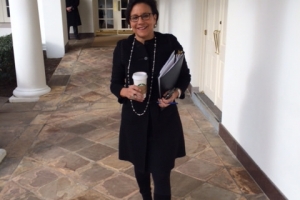Support migrant centric journalism today and donate

 • Watch This Video
• Watch This VideoOn 06 June 2007, Google executives called for the United States government to raise the annual H-1B visa cap from the current annual quota of 65,000. Google used the example of Sergey Brin, one of the Google founders, to illustrate how highly skilled migrants benefit the U.S. economy.
<$adv0> "We opened our doors to Sergey's parents - a mathematician and an economist," said Google VP of people operations, Laszlo Bock. "Our educational system served Sergey well - he attended the University of Maryland and Stanford University. Our free market economy supported Sergey and Larry's entrepreneurship and rewarded it when they proved that they could turn their idea into a successful business. And we continue to maintain an environment where entrepreneurs, regardless of where they started, want to come here to build their companies."
Brin's parents came to the U.S. from the Soviet Union in 1979. Sergey and Larry Page, who met at Stanford University, went on to found Google Inc. in 1998.
He also highlighted the example of Krishna Bharat of India, who came to work for Google in 1999 under an H-1B visa. Bharat is the chief creator of Google News and is currently the principal scientist on the project.
Bock noted that 8% of Google's U.S. employees are working in the country under H-1B visas. He said that Google hires from abroad because of the company's need for specialized skills that can only be found by looking overseas - or by hiring foreigners studying in U.S. universities.
Bock urged Congress to increase the cap from 65,000. He also stated that Google was not the only company to benefit from immigration.
"Intel, eBay, Yahoo, Sun Microsystems, and many other companies were all founded by immigrants who were welcomed by America," Bock said. "In fact, over the last 15 years, foreign nationals have started 25% of U.S. venture-backed public companies, accounting for more than $500 billion in market capitalization and adding significant value to our economy."
He also underlined the need for America to stay globally competitive.
"We are not the only ones recruiting talented engineers, scientists and mathematicians", he said. "We are in a fierce worldwide competition for top talent unlike ever before. As companies in India, China and other countries step up efforts to attract highly skilled employees, the U.S. must continue to focus on attracting and retaining these great minds."
"America's edge depends on the ability of U.S. companies' abilities to innovate - and that ability to innovate and create, in turn, depends on having the best and brightest workers," he added.





















